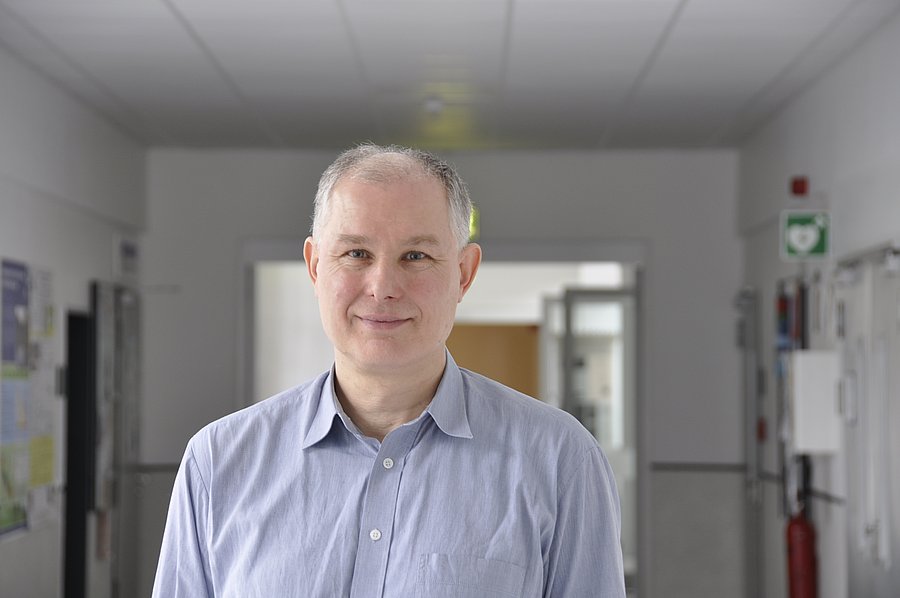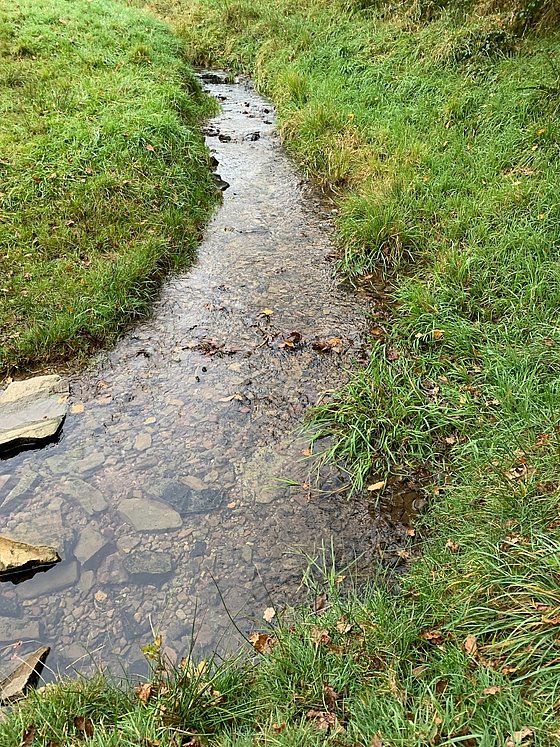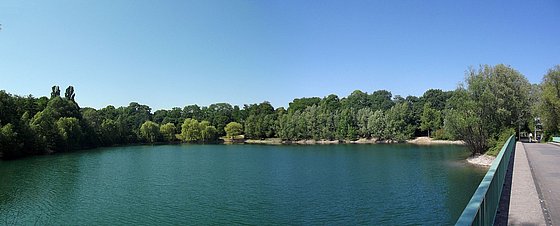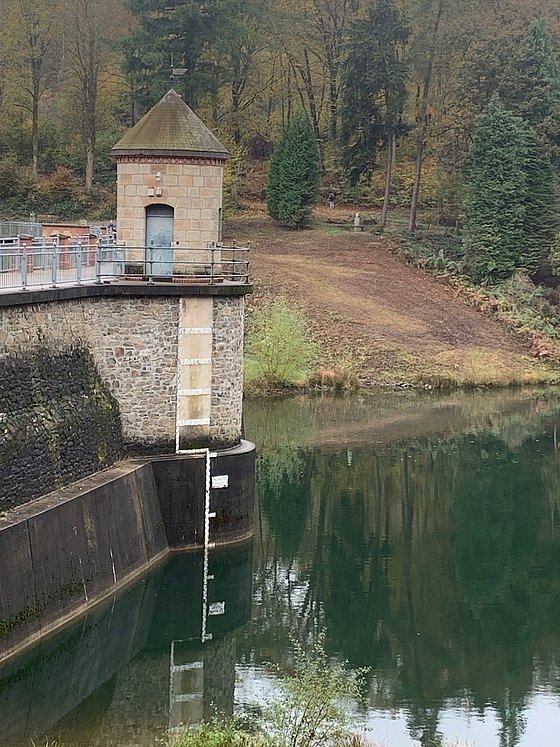
Prof. Prof. mult. Dr.-Ing. agr. Jörg Rinklebe / Soil and groundwater management
Photo: UniService Transfer
Rivers act as sewages for society
Soil and groundwater expert Jörg Rinklebe on the water quality in our streams, rivers and lakes
Some advertise with the slogan 'Nature goes into bloom here' or 'The world drinks from this spring', others entice with 'Swimming, hiking, enjoying nature, that's your holiday at a lake in Germany'. Both praise our waters to the skies and ignore the actual state of our streams, rivers and lakes. In fact, according to the European Environment Agency (EEA), two thirds of our so-called surface waters are in a poor state. For Professor Jörg Rinklebe, Head of Soil and Groundwater Management at the University of Wuppertal, this is in no way surprising and he puts the situation in unmistakably drastic terms, saying: "Our rivers have traditionally functioned as cesspools for society."

Schmalenhofer Bach in the Scharpenacken local recreation area in Wuppertal
Rivers are hotspots of harmful substances
"Anyone who knows a bit about the subject," says Rinklebe, "knows that our rivers often act as cesspools for society. You have to realise that! Even historically, all rubbish has gone and continues to go into the rivers." This can be observed in many developing countries where there are no sewage plants. All waste, municipal waste, excreta, industrial waste, everything is discharged into the rivers. Moreover, it used to be the same in Germany. This was also the case in Wuppertal 100 years ago, when the dyeing industry was booming here. "The Wupper was often really colourful. Sometimes red, green, blue, depending on which colour the textiles were being dyed." As a result, pollutants have always been deposited in and on the waters. As many watercourses also flow into lakes or the sea, these waters are naturally also polluted.
29% of water bodies are heavily polluted with chemicals
According to a report by the European Environment Agency (EEA), more than 90% of groundwater in the EU is rated as good, but in terms of chemical pollution, this figure is only 29%. "And that is absolutely alarming, especially when we realise that we get 60-70% of our drinking water from groundwater”, explains the expert. In other words, we need clean groundwater, clean drinking water, so that we can also ensure human nutrition and avoid health problems. The poorer the quality of our groundwater, the more we have to do to treat it as drinking water." Groundwater is not only important for human health, but also for the ecosystems themselves, he adds. "Plants, animals, everyone feeds on it. There is rising groundwater from the soil, and if that is already polluted, then it pollutes the plants as well. The wild animals eat them and the polluted waterenters the entire cycle."

Fühlinger See, public domain
The cocktail of pollutants in our waters
The substances that can be detected in our waters are very extensive. Rinklebe explains: "It is often a cocktail of pollutants. The best known is of course nitrate, which is a whole host of nitrogen fertilisers that we refer to as diffuse agricultural inputs." Plants need a lot of macronutrients for good development and a good yield, "these are nitrogen, phosphorus and potassium, i.e. they are heavily fertilised. It is very difficult to find the optimum in practice." This is why we know that farmers usually fertilise too much to prevent a deficiency. "But this leads to over-fertilisation, the soil can no longer absorb it and it ends up in the groundwater." Plants usually only absorb substances in elemental form and not in ionic form, explains the researcher, which means that nitrate is never directly absorbed by the plants. In addition, the soil can only retain nitrate to a limited extent. "Germany in particular has industrialised agricultural production. The limit values are exceeded at many measuring points. That's why the EU has also taken Germany to court."
However, nitrogen fertilisers in agriculture are not the only ingredient in the pollutant cocktail. "There is the large group of organic pollutants," explains Rinklebe, "these are the PFAS (per- and polyfluorinated chemicals). Then there are the PAHs (polycyclic aromatic hydrocarbons), there are PCBs (polychlorinated biphenyls) and of course many more. Microplastics, hormones, which are also used on a massive scale in animal production, antibiotics - all of these also end up in our wastewater, are not sufficiently filtered in our wastewater treatment plants and ultimately end up in the environment." The problem in the filter systems lies in the three purification stages used to date. A fourth stage, which could also absorb the latter pollutants, is currently still being researched and tested and can only be implemented in pilot plants. Heavy metals are another source of pollutants. "Heavy metals are a major problem. Arsenic, cadmium, lead, chromium, copper, and mercury - we also focus on this whole range of pollutants in our research. This is one of the biggest environmental problems we have!"
Climate change versus pollution
"Climate change is important," emphasises the researcher, "we have to focus on it! However, that alone is not enough. The problem of pollution in the environment and in people worldwide is actually much bigger. Microplastics and antibiotics have even been found in the blood and brain, and have even been detected in breast milk." Education is the be-all and end-all in this case. "That is also the task of science," says Rinklebe, "to point out the problems and not only publish in specialist journals, but also to approach the press and television in order to raise awareness. I believe that the fact that chemicals are a major environmental problem is not yet in most people's minds. This is also because many people today are saturated with information and no longer want to hear about it. You don't realise it immediately, but only after years or even decades and this is the problem." Rinklebe believes that educating and informing the outside world is a major task for universities, which must also advise our politicians.
High lead concentration in NRW
Every state and every region has to contend with different levels of pollution. Citizens are no longer aware of many contaminated sites. "Clearly, we still have heavy metals in the mining industry," says Rinklebe. "In Saxony, we still have high levels of contaminants from uranium mining from the GDR era, when the Soviets mined uranium there for their nuclear weapons. In North Rhine-Westphalia, there is an increased concentration of lead from the old industrial era, across large parts of the Land." In this context, many air emissions should also be mentioned, the quality of which has improved significantly in Germany in recent decades, but the pollutants carried in the air via particulate matter are still there. "We have pollutants in our buildings, asbestos is an issue, i.e. the problems are very diverse."

Ronsdorf Dam
And the Wupper?
The Wupper Association writes on its homepage: "In recent years, the quality of the Wupper's water has steadily improved. Numerous fish species are now swimming in the river again." Rinklebe says: "The water quality in the rivers in Germany has generally improved quite a bit." Although there are always a number of pollutants in the sediments, these can now be easily separated by dredging dormant bodies of water such as reservoirs. A further step towards the renaturalisation of our waters sounds very encouraging from the researcher's mouth: "Recently, attempts have been made to reverse river straightening and return the rivers to their old, natural beds. The river margins are also being replanted with woody plants or wetland biotopes are being created. Breeding sites for songbirds will be established and places for amphibians and small animals will be created."
Uwe Blass
Prof. Prof. mult. Jörg Rinklebe has been Professor of Soil and Groundwater Management at the University of Wuppertal since 2006. He is recognised worldwide as one of the most influential scientists in his field. His work is cited very frequently, which is why he was named a "Highly Cited Researcher". He is ranked 4th in the world rankings for environmental sciences, although only a few German scientists have ever been listed in the top 100. From 1997 to 2006, he worked as a scientist, research assistant and project manager in the Soil Research Section of the UFZ Environmental Research Centre Leipzig-Halle GmbH in Halle. He studied ecology for a year at the University of Edinburgh in Scotland (UK). He studied agriculture at Martin Luther University in Halle-Wittenberg, specialising in soil science and plant nutrition.
